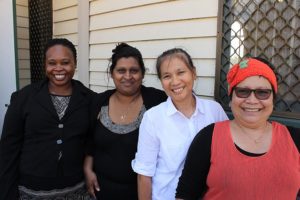Early support improves migrant employment outcomes – study
Language courses geared to employment can be highly effective in getting migrants from non-English speaking backgrounds into work especially if they are begun soon after arrival, new research has found.
And including work placements, which give migrants first-hand experience of Australian workplaces, in the courses is also valuable, the study found.
It also found that post course support, such as job clubs, can help migrants who do not immediately find work into employment.
The study surveyed 460 newly arrived migrants and refugees studying English in Melbourne through Settlement Language Pathways to Employment (SLPET) courses about their employment experiences.
 It found newly arrived migrants and refugees struggle to break into Australia’s labour market but can succeed if given adequate early support in job hunting.
It found newly arrived migrants and refugees struggle to break into Australia’s labour market but can succeed if given adequate early support in job hunting.
The study titled ‘Transitions to employment and education for new migrants in Australia’ found many migrants were underemployed, had lost career status and were on low wages.
Although 75 per cent of respondents had overseas work experience at the point of enrolment in their course, less than a quarter (24 per cent) had gotten a job in Australia, the study by refugee and migrant settlement agency AMES Australia found.
It found that six months after completing a course 61 per cent of respondents were available for work. Of those, just over half (56 per cent) had a job while 44 per cent were looking for work.
Those not looking for work were mostly studying full time (27 per cent). The remaining group (12 per cent) were mostly full time carers.
The study found that completing a course sooner gave migrants a better chance of finding a job.
“Sixty three per cent of people who started a course within six months of arrival were working compared to 50 per cent of those who had been in Australia for five years or longer,” the study said.
The study’s lead author Monica O’Dwyer said courses such as SLPET were highly effective in assisting migrants from non-English speaking backgrounds to find work in Australia.
“They play an important role in facilitating the entry of skilled migrants with low level English into the labour market,” Ms O’Dwyer said.
“Work placement is an extremely valuable part of these programs. It gives migrants local work experience and can connect them with local employers,” she said.
Ms O’Dwyer said participation in the programs by employers from a broad range of industries and for longer periods of time could increase opportunities for migrants to gain Australian workplace skills in areas of work related to their pre-migration experience.
She said offering post-course support could also be helpful in helping migrants find work.
“Things like job clubs, networks of people in similar occupations and post course support are really useful,” Ms O’Dwyer said.
The study found many migrants reported having found work through personal or social connections but half reported that they had no support in seeking work and only a third were connected to the federal government’s jobactive program.
The study found that the students believed that confidence and proficiency in English were the most important factors in finding work.
Ms O’Dwyer said that those who found jobs mostly worked on a casual basis and fewer were in permanent, fixed term or self-employment.
“There is evidence of significant underemployment amongst the migrants in this study. The majority of workers (67 per cent) were in part time work of less than 35 hours per week. Of these, 61 per cent said they would like to work more hours,” Ms O’Dwyer said.
“Half of the working respondents told us they were earning more than $20 per hour and 4 per cent said they were earning more than $30 an hour.
“But 32 per cent said they were earning less than $20 an hour. The relatively low pay rates reflect the low status occupations of many respondents.
“Adult casual workers receiving a 25 per cent casual loading would be paid more than $20 per hour under the current national minimum wage order in Australia,” Ms O’Dwyer said.
Carissa Gilham
AMES Australia












